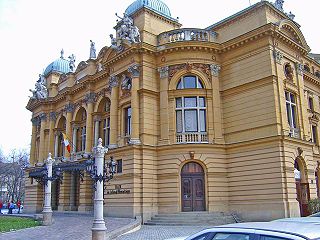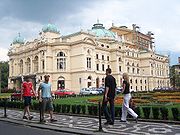
Juliusz Slowacki Theatre
Encyclopedia


Kraków
Kraków also Krakow, or Cracow , is the second largest and one of the oldest cities in Poland. Situated on the Vistula River in the Lesser Poland region, the city dates back to the 7th century. Kraków has traditionally been one of the leading centres of Polish academic, cultural, and artistic life...
, Poland
Poland
Poland , officially the Republic of Poland , is a country in Central Europe bordered by Germany to the west; the Czech Republic and Slovakia to the south; Ukraine, Belarus and Lithuania to the east; and the Baltic Sea and Kaliningrad Oblast, a Russian exclave, to the north...
, , erected in 1893, was modeled after some of the best European Baroque
Baroque
The Baroque is a period and the style that used exaggerated motion and clear, easily interpreted detail to produce drama, tension, exuberance, and grandeur in sculpture, painting, literature, dance, and music...
theatres, and named after Polish poet Juliusz Słowacki in 1909.
History
Designed by Jan ZawiejskiJan Zawiejski
Jan Zawiejski, born Jan Baptysta Feintuch, was a Jewish, Polish architect, representative of historism.His most notable design works include Juliusz Słowacki Theatre, Ohrenstein House at corner of Stradom and Dietla Street it was build for Moshe Löbel Ohrenstein & his wife Reizel Wald in Kraków ,...
, the theatre was erected on Holy Ghost Square (Plac Św. Ducha) in place of the former 14th century church and monastery of religious order
Religious order
A religious order is a lineage of communities and organizations of people who live in some way set apart from society in accordance with their specific religious devotion, usually characterized by the principles of its founder's religious practice. The order is composed of initiates and, in some...
'Duchacy' or Order of the Holy Ghost
Order of the Holy Ghost
The order was responsible for running hospitals - Hospitals of the Holy Ghost - throughout Europe for centuries, and in its heyday the number of its houses ran into many hundreds...
(hence the name of the square). The church had been converted into a residential building due to secularization
Secularization
Secularization is the transformation of a society from close identification with religious values and institutions toward non-religious values and secular institutions...
of the Polish male branch of the cloister in 1783. The city council of Kraków decided to demolish it in 1886 in order to make room for a new theatre. The church was dismantled in May 1892an event which caused much controversy, notably the emotive
Emotive (sociology)
“Emotional expressions”, also called “emotives” are an effort by the speaker to offer an interpretation of something that is observable to no other actor . If emotions are feelings, emotives are the expressions of those feelings through the use of language, specifically through constructions that...
declaration of Polish painter Jan Matejko
Jan Matejko
Jan Matejko was a Polish painter known for paintings of notable historical Polish political and military events. His most famous works include oil on canvas paintings like Battle of Grunwald, paintings of numerous other battles and court scenes, and a gallery of Polish kings...
, that he would never exhibit his paintings in Kraków again.
The new theatre opened on October 21, 1893. It was an exquisite example of the Polish Eclectic
Eclecticism
Eclecticism is a conceptual approach that does not hold rigidly to a single paradigm or set of assumptions, but instead draws upon multiple theories, styles, or ideas to gain complementary insights into a subject, or applies different theories in particular cases.It can sometimes seem inelegant or...
architecture, the first building in Kraków designed for and equipped with electric light. Initially it was called Municipal Theatre (Teatr Miejski). Only in 1909 did it receive the name of Juliusz Słowacki, a Polish poet and playwright of Romanticism
Romanticism in Poland
Romanticism in Poland was a literary, artistic and intellectual period in the evolution of Polish culture that began around 1820, coinciding with the publication of Adam Mickiewicz's first poems in 1822. It ended with the suppression of the January 1863 Uprising against the Russian Empire in 1864. ...
.
Inauguration took place with a program consisting of excerpts from Aleksander Fredro
Aleksander Fredro
Aleksander Fredro was a Polish poet, playwright and author.-Life:Count Aleksander Fredro, of the Bończa coat of arms, was born in the village of Surochów near Jarosław, then a crown territory of Austria. A landowner's son, he was educated at home. He entered the Polish army at age 16 and saw...
's Zemsta, Juliusz Słowacki's Balladyna
Balladyna (drama)
"Balladyna is a tragedy written by Juliusz Słowacki in 1834 and published in 1839 in Paris. It is a notable work of Polish romanticism, focusing on the issues such as thirst for power and evolution of the criminal mind...
and Adam Mickiewicz
Adam Mickiewicz
Adam Bernard Mickiewicz ) was a Polish poet, publisher and political writer of the Romantic period. One of the primary representatives of the Polish Romanticism era, a national poet of Poland, he is seen as one of Poland's Three Bards and the greatest poet in all of Polish literature...
's Konfederaci Barscy. The theatre staged its first full-length production, Fredro's Śluby Panieńskie, four days later.
During Nazi Germany
Nazi Germany
Nazi Germany , also known as the Third Reich , but officially called German Reich from 1933 to 1943 and Greater German Reich from 26 June 1943 onward, is the name commonly used to refer to the state of Germany from 1933 to 1945, when it was a totalitarian dictatorship ruled by...
occupation of Poland, the theatre was run by a German troupe. The last Polish play for the next 6 years was produced in Autumn 1939. The theatre reopened for Polish audience in February 1945.
Since March 27, 1976, the theatre is accompanied by the Small Stage housed in the former electric plant (designed in 1890s, to provide the theatre with its own electricity). In 2000 a third stage was added, the summertime Next to the Pump Stage. A fourth one (Stage in the Gate) opened on November 7, 2003.
Directors
The first director of the Theatre was Tadeusz Pawlikowski (1893–1899), followed by Józef Kotarbiński (1899–1905) and Ludwik SolskiLudwik Solski
Ludwik Solski , born Ludwik Napoleon Karol Sosnowski,was a Polish stage actor and theatre director. From his stage debut in 1876 until his death he played in nearly a thousand roles.Between 1905 and 1913 he was the director-general of the municipal theatre in Cracow...
(1905–1913). Tadeusz Pawlikowski resumed this position in the years 1913-1915. Playwright Lucjan Rydel
Lucjan Rydel
Lucjan Rydel a.k.a. Lucjan Antoni Feliks Rydel , was a Polish playwright and poet from the Young Poland movement.-Life:...
became the Theatre's director for one season during 1915-1916. Adam Grzymala-Siedlecki took that role in the years 1916-1918.
After World War I
World War I
World War I , which was predominantly called the World War or the Great War from its occurrence until 1939, and the First World War or World War I thereafter, was a major war centred in Europe that began on 28 July 1914 and lasted until 11 November 1918...
, the theatre was directed by Teofil Trzciński (1918–1926), Zygmunt Nowakowski (1926–1929), once again Trzciński (1929–1932), Juliusz Osterwa (1932–1935) and Karol Frycz (1935–1939). Frycz and Osterwa became the directors again after World War II
World War II
World War II, or the Second World War , was a global conflict lasting from 1939 to 1945, involving most of the world's nations—including all of the great powers—eventually forming two opposing military alliances: the Allies and the Axis...
(Frycz from 1945–1946, and Osterwa in 1946-1947). The next directors were Bronisław Dąbrowski (1947–1950) and Henryk Szletyński (1950–1955). Bronisław Dąbrowski was once again appointed as director from 1955-1972. Krystyna Skuszanka and Jerzy Krasowski directed the theatre from 1972 to 1981. Andrzej Kijowski
Andrzej Kijowski
Andrzej Kijowski was a Polish literary critic, essayist, prose and screenwriter. His son is poet and critic Andrzej Tadeusz Kijowski....
's short period of directorship ended the same year with the imposition of martial law in Poland
Martial law in Poland
Martial law in Poland refers to the period of time from December 13, 1981 to July 22, 1983, when the authoritarian government of the People's Republic of Poland drastically restricted normal life by introducing martial law in an attempt to crush political opposition to it. Thousands of opposition...
. Mikołaj Grabowski (1982–1985) was followed by Jan Paweł Gawlik (1985–1989), Jan Prochyra (1989–1990), Jerzy Goliński (1990–1992) and Bogdan Hussakowski (1992–1999). Current director is Krzysztof Orzechowski.
Cultural significance

Young Poland
Young Poland is a modernist period in Polish visual arts, literature and music, covering roughly the years between 1890 and 1918. It was a result of strong aesthetic opposition to the ideas of Positivism...
movement and was closely related to the rediscovery of Romantic drama as well as the premiere productions of plays by Polish national playwright Stanisław Wyspiański.
The significance of the Polish Romantic tradition under the foreign occupation and especially Słowacki's legacy was reflected in the first festival of his plays organized there in 1909. It was at this time that the Theatre adopted the name of Słowacki and became known as Juliusz Słowacki Theatre.
Diana Poskuta-Włodek wrote about its first productions:
- "The proposal of a theatre based on a synthesis of the visual arts, acting, music, light and drama is as natural as theatre itself. At the time, however, it was an avant-gardeAvant-gardeAvant-garde means "advance guard" or "vanguard". The adjective form is used in English to refer to people or works that are experimental or innovative, particularly with respect to art, culture, and politics....
solution that challenged reigning canons." http://www.culture.pl/en/culture/artykuly/in_te_Słowackiego_krakow
At the Theatre, the audiences could witness actors such as Kazimierz Kamiński, Ludwik Solski
Ludwik Solski
Ludwik Solski , born Ludwik Napoleon Karol Sosnowski,was a Polish stage actor and theatre director. From his stage debut in 1876 until his death he played in nearly a thousand roles.Between 1905 and 1913 he was the director-general of the municipal theatre in Cracow...
, Maksymilian Węgrzyn, Antonina Hoffman, Wanda Siemaszkowa, Stanisława Wysocka and Aleksander Zelwerowicz
Aleksander Zelwerowicz
Aleksander Zelwerowicz was a Polish actor, director, theatre president and a teacher. He received the Order of Polonia Restituta and is one of the Polish Righteous among the Nations....
. Theatre artists like Juliusz Osterwa and Kazmierz Junosza-Stepowski began their careers at the Słowacki Theatre, and Helena Modrzejewska made numerous guest appearances. During the interwar period
Interwar period
Interwar period can refer to any period between two wars. The Interbellum is understood to be the period between the end of the Great War or First World War and the beginning of the Second World War in Europe....
, the theatre was overshadowed by the Warsaw theatre scene, but still it was considered to be one of the most important stages in Poland. In 1980 the Słowacki Theatre staged the world premiere of Pope John Paul II
Pope John Paul II
Blessed Pope John Paul II , born Karol Józef Wojtyła , reigned as Pope of the Catholic Church and Sovereign of Vatican City from 16 October 1978 until his death on 2 April 2005, at of age. His was the second-longest documented pontificate, which lasted ; only Pope Pius IX ...
Our God's Brother (Brat naszego boga), a production whose significance was above all political.

